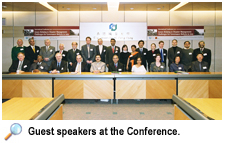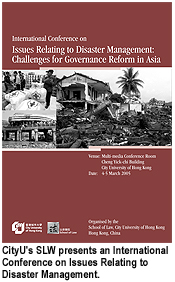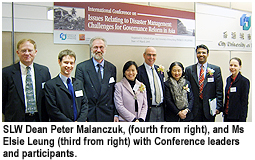The
School of Law (SLW) of City University of Hong Kong held its first
International Conference on Issues Relating to Disaster Management: Challenges for Governance Reform in
Asia
, 4-5 March. At the Conference, leading Chinese experts joined others from
Australia,
Canada,
Germany,
Switzerland,
India,
Indonesia,
Japan,
Thailand, The Netherlands,
Singapore,
Sri Lanka, and the
United States of America, to present papers and discuss issues relating to disaster management and governance in
Asia.
The objectives of the Conference included examining the various legal and governance issues related to disaster management, with a view to critical assessment of the level of preparedness in the South and South East Asian countries that were affected by the December 2004 tsunami. Nearly 300,000 people were killed and thousands more displaced.
The Conference, which attracted participation from staff of the United Nations and other government and inter-governmental organizations, academics, and members of non-governmental organizations, was inaugurated by
Ms Elsie Leung, GBM, JP, Secretary for Justice, Hong Kong SAR.
Professor (Chair) Peter Malanczuk, SLW Dean, delivered the welcome address and
Professor DK Srivastava, SLW Associate Dean, proposed a vote of thanks.
Mr C Raj Kumar, SLW Lecturer and organizer of the Conference, introduced the theme.
Professor (Chair) Wang Gui Guo,
Professor Anton Cooray,
Dr Lin Feng and
Dr Priscilla MF Leung, SLW Associate Dean (External Affairs), chaired various sessions.
In his message to the organisers of the Conference, the United Nations Secretary General Mr Kofi Annan observed:
The tsunami of 26 December 2004 was an unprecedented, global natural disaster. We are already seeing an unprecedented, global response. But it's not enough to pick up the pieces when a tragedy like this happens. We must draw and act on every lesson we can, and prevent such tragedies from occurring in the future. The tsunami catastrophe confirmed a disturbing trend. Over the past 10 years, the number of people killed by natural disasters has increased by almost 50 per cent from the previous decade. The loss of human life has been matched by a rise in the loss of livelihoods and a huge cost to development. At the same time, we have learnt a great deal about what works to reduce the impacts of disaster -- in terms of preparedness before it strikes, and mitigation once it does. We have learnt about the value of investing in changed behaviour.

On the importance of the Conference, Professor Peter Malanczuk observed, "The Conference aims to critically assess legal, policy and governance issues on the international level and within countries affected by the recent tsunami, how dealing with such disasters can be improved, and how governments and other actors can be better prepared. Aside from disaster management experts, representatives from NGOs and other parts of civil society are also speaking at the conference. The conference underlines the importance of more interaction between governments, NGOs, business enterprises, academia, the media and other sectors of civil society."

The guest speakers examined and evaluated the working of public and private institutions in Asia that are vested with the task of disaster management and recommended ways to improve their efficiency and effectiveness; they addressed issues related to financial aid and other relief work for the victims of the earthquake and tsunami and the necessary response to ensure prompt aid and relief, as well as the impact on governance; they examined the effectiveness of the response mechanisms on the part of governments, NGOs, civil society, intergovernmental organisations, aid and relief organisations and the media.
The School of Law's principal objective is to support and improve the provision of legal education and training in Hong Kong, through teaching, research, international publications, and specialist projects. Distinguished teachers and scholars from Greater China and elsewhere have been recruited over the years to help achieve these goals. Additionally, the School has developed close institutional links with a variety of overseas institutions.



